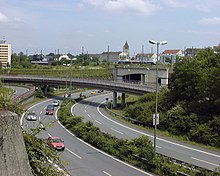Ernst Rein
Ernst Rein (born November 21, 1858 in Chemnitz , † September 25, 1953 in Bielefeld ) was a German engineer and entrepreneur.
Life
In 1873 the then 14-year-old Ernst Rein began an apprenticeship as a locksmith in Meerane and then attended the master school in Chemnitz. He got his first job as a technical draftsman at Maschinenfabrik Oerlikon in Switzerland. He then gave technical drawing lessons in Milwaukee (USA) for 2 years , primarily for German immigrants. After his return to Germany, from 1885 he worked as a designer at the Schiess company in Düsseldorf.
In 1890, together with the secretary of the Bielefeld Chamber of Commerce Theodor Droop , the company Droop & Rein machine tool factory , later Droop & Rein machine tool factory and iron foundry , was founded, whose main field of activity was the construction of special machines. After the death of his partner Theodor Droop in 1906, Ernst Rein became the sole owner of the company in 1910.
Large parts of the plant fell victim to the bombs during World War II. On September 30, 1944, his private house was hit and collapsed. Ernst Rein was buried in the cellar, but managed to dig himself and others free again. With British approval, he was able to rebuild the company, which he headed until his death in 1953.
controversy
In the post-war period, the Droop & Rein company came under fire and was accused of using forced laborers for armaments production during the war and, according to the ITS (International Tracing Service) , of having run its own civil labor camp for this purpose . However, these processes cannot be placed at the expense of Ernst Rein. During this time, he was banned from operating, as he openly opposed and forbade a deployment of the NSDAP in his plant. The company was converted to armaments production without him.
Others
In his honor, the city of Bielefeld has renamed the street on which the original company premises were located to Ernst-Rein-Straße. From the 1970s to 1994 there was the Ernst-Rein-Bad on Schloßhofstraße, a municipal indoor swimming pool that was built with financial support from the owner family.
literature
- Dagmar Kerschbaumer and Johannes Großewinkelmann: Theodor Droop (1849–1906) and Ernst Rein (1858-1953). In: Wolfhard Weber (ed.) Bielefeld entrepreneurs from the 18th to the 20th century. (= Rheinisch-Westfälische Wirtschaftsbiographien , Volume 14.) Aschendorff, Münster 1991, pp. 333–355.
Individual evidence
- ^ Rein CNC-Service GmbH: history. Retrieved March 9, 2011 .
- ^ Labornet: 2500 companies - slave owners in the Nazi camp system. Retrieved February 13, 2016 .
- ^ Anne Kaiser, Martin Weinmann: The National Socialist Camp System: (CCP) Frankfurt am Main: Zweiausendeins , 1998., ISBN 3861502615
- ^ BBF - Bielefelder Bäder und Freizeit GmbH: History. Retrieved September 22, 2014 .
| personal data | |
|---|---|
| SURNAME | Pure, serious |
| BRIEF DESCRIPTION | German engineer and entrepreneur |
| DATE OF BIRTH | November 21, 1858 |
| PLACE OF BIRTH | Chemnitz |
| DATE OF DEATH | September 25, 1953 |
| Place of death | Bielefeld |
